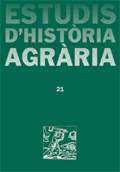Edicts, fines and rural guard. Preservation of rural property and construction of the liberal municipality
DOI:
https://doi.org/10.1344/eha.2008.21.11-47Keywords:
land ownership, fines, edicts, liberal town council, Bourbon Restoration, lands of Lleida, CataloniaAbstract
The aim of this research is to study the behaviour of the main mechanisms of preserving rural ownership – fines, edicts and rural guards– in a framework of construction of liberal municipality between the XIX and XX centuries. With this goal in mind, we have studied the production of these mechanisms in four town councils in Lleida, which have different regimes regarding dry/irrigation lands, animal transport, and exploitation of grass. Within this period, it’s obvious the intensification of the repressive activity with regard to the so-called abuses against ownership, which takes place in the context of a general intensification of the regulating, control and repressive activities in the town councils. The actions taken against the faults comitted in rural ownerships became specially intense in those town councils with a regime of free exploitation of grass on behalf of its owners. Therefore, the burden of repression befell the owners of sheep and goat flocks. Specially in these cases, the town hall repressive activity was brought about according to repressive cycles, which were characterized by the increase of the number of fines and their severity, by the increase of publications of edicts and their toughening conditions and, sometimes by the appointment of rural guards.Downloads
Published
2011-01-01
Issue
Section
Miscel·lània
License
From issue 29 (2017), when submitting a proposal, the author retains the copyright but grants the journal the first publication of the work.
The texts will be disseminated under the Creative Commons licence Attribution Non commercial (CC-BY-NC) which allows the work to be shared with third parties, provided that authorship is acknowledged, the initial publication in this journal, the conditions of the licence are met and no commercial use is made.



